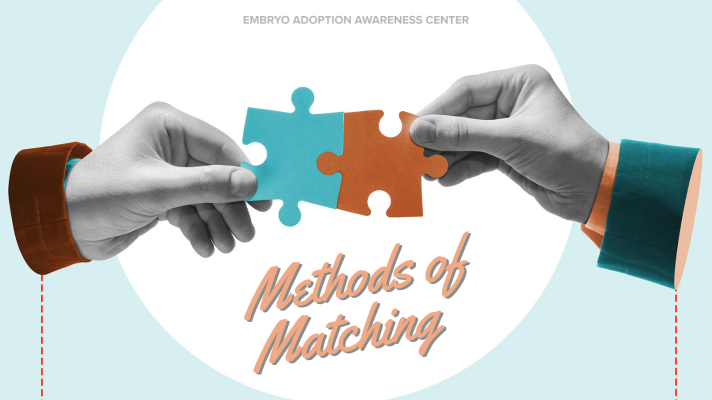Are you interested in donating your embryos or are you interested in adopting your embryos? The first thing you need to do is figure out how to find each other!
What types of matching systems are available when it comes to donating and receiving embryos? More than one, it turns out.
1. Self-Matching
Self-matching is what it sounds like. You are either an embryo donor or a recipient seeking a match via social media groups or personal connections. The matched families will have to work together to take care of the legal, clinical and social aspects of the relationship they are establishing. It is a ‘DIY’ type of matching!
2. Web-based online matching programs
These programs provide profiles of embryo donor families looking for a match with a recipient family. Usually there is no fee for donor families to post a profile. The recipient families pay a fee to access embryo donor profiles. The families are reviewing the profile information to make a match determination. The online program may or may not provide additional services such as contracts and shipping.
3. Fertility clinic in-house embryo donation program
There are fertility clinics throughout the U.S. that have in-house embryo donation programs. The embryos accepted into these programs are donated by patients who had their embryos created at that clinic. The clinic takes ownership of the embryos. Common characteristics of these programs are:
- Most often anonymous
- Usually have a waitlist of recipient families waiting for embryos
- Donated embryo sets are often distributed among multiple waiting recipients
- The embryo donor does not receive information about transfers/pregnancies/childbirths
- Births of genetic siblings between recipient families is not communicated
- Clinics will only keep medical records for seven years
4. Embryo Adoption Program
An embryo adoption program will give both donors and adoptive families the greatest protections and the greatest personal involvement when it comes to matching.
- Some require (and maybe provide) an embryo adoption home study and/or criminal background checks
- They will most often use a comprehensive, personalized matching process
- They will provide the legal contracts for the exchange of embryos
- They will arrange for the shipment of embryos
Embryo recipient families receive more information about an embryo donor from an agency program than they will from any other program.
- Clinic documents and embryology reports will be sent to their FET clinic
- The embryo donors will provide comprehensive medical history
- If donor gametes were used, the agency will ensure that the embryos can legally be donated
- The agency will ensure that all FDA rules and regulations for embryo donation are fulfilled
- A licensed adoption agency is required by law to keep permanent records


Recent Comments